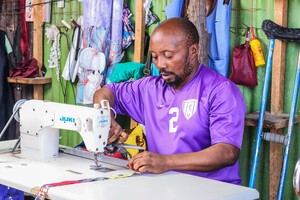share

Esther Akuwam, a Kenyan woman living in Kakuma, manages a grocery shop. | © Imani Rugenge / HI
In Kakuma refugee camp, refugees and Kenyans run a number of micro-enterprises. HI and its partners are helping them to promote and develop their businesses.
In Kenya, the employment rate for people with disabilities is estimated at just 1%, compared with 73.8% for people without disabilities1. The informal sector and micro-enterprises therefore represent an essential source of work and income for people with disabilities, with around 4.3% of Kenyan micro-enterprises owned by disabled people2. In view of these findings, HI launched its ‘InBusiness’ project in Kakuma in 2019, to support and promote the employment of people with disabilities and their caregivers.
HI brought together civil society actors, organisations of people with disabilities, people from the business world and local and national authorities and jointly they rolled out a vast programme of assistance and skills development for micro-entrepreneurs living in the Kakuma refugee camp and the surrounding Kenyan communities.
The participants were given support to define their projects and training to improve their skills in sales techniques, financial and budgetary rules, marketing, and so on. Esther Akuwam, 50, a Kenyan living in Kakuma, was among them. Esther runs a grocery shop and is the mother of a child with intellectual disabilities.
“I used to run my business without keeping track of the goods or recording my transactions, and I didn't separate the money from the shop from my own money. Through the project, I've been put in touch with the bank, where I carry out my transactions and I even have a savings account. I’ve also got into the habit of keeping detailed business records, so I know which products to buy and when, which helps me reduce losses,” says a delighted Esther Akuwam.
 The project also puts micro-entrepreneurs in contact with public and private institutions to strengthen their links, foster collaboration and open up new markets for traders and craft workers.
The project also puts micro-entrepreneurs in contact with public and private institutions to strengthen their links, foster collaboration and open up new markets for traders and craft workers.
Christian Ngongo is a 40-year-old Congolese refugee with a physical disability who runs his own sewing workshop. He lives with his wife and two children in Kalobeyei refugee camp. Christian sews and designs fabrics. Before taking part in the project, he already ran his own small business. His wife was in charge of selling his creations to her friends, but his shop was often locked, as he worked from home most of the time. Through the ‘InBusiness’ project, Christian met with local business people and public institutions.
“Thanks to my new network, I've started working with two schools, making their uniforms. This has enabled me to buy two new sewing machines and take on two employees; I feel proud to be an employer. The skills and knowledge I’ve acquired through the training, as well as all the new contacts I’ve made, have enabled me, as a disabled refugee, to develop my business. I’ve gained financial independence, which is essential for me, because now I can support my family and help them in times of crisis,” explains Christian Ngongo.
Christian also took part in training courses to identify new growth levers for his business. He took a particular interest in marketing, and was inspired to start displaying some of his designs in front of his shop. His designs are a huge success, attracting new customers every day. The ”InBusiness” project, which ran between June 2019 and July 2024, has helped to train and empower almost 1,200 people like Esther and Christian.
Inclusive Futures / Institute of Development Studies (2020), Disability Inclusive Development Kenya Situational Analysis June 2020 update.








HI is an independent and impartial aid organisation working in situations of poverty and exclusion, conflict and disaster. We work alongside people with disabilities and vulnerable populations, taking action and bearing witness in order to respond to their essential needs, improve their living conditions and promote respect for their dignity and fundamental rights.
HI is an independent and impartial aid organisation working in situations of poverty and exclusion, conflict and disaster. We work alongside people with disabilities and vulnerable populations, taking action and bearing witness in order to respond to their essential needs, improve their living conditions and promote respect for their dignity and fundamental rights.